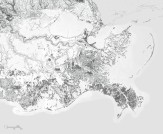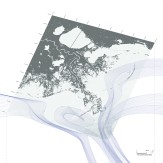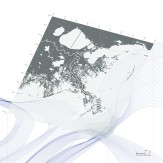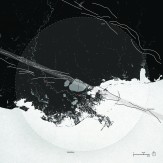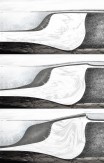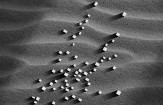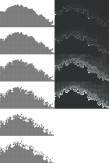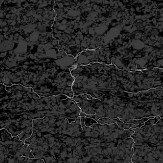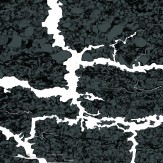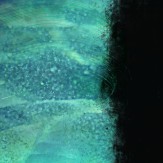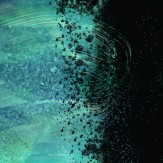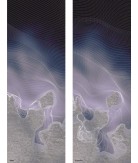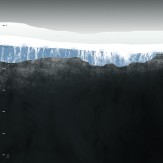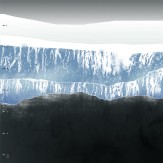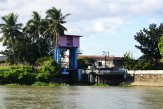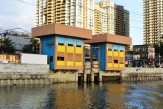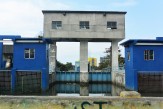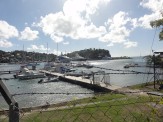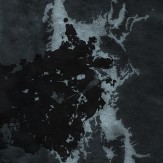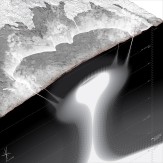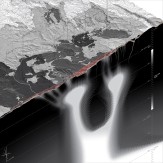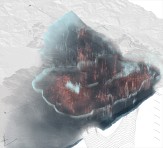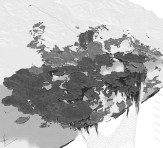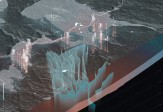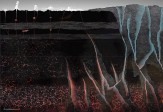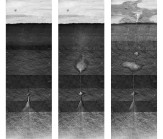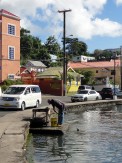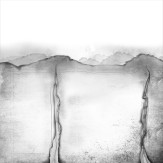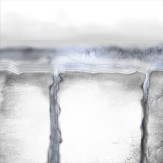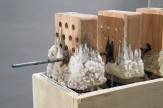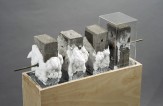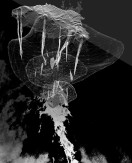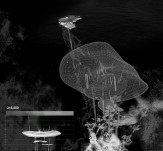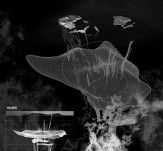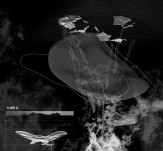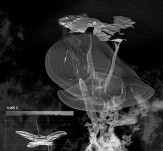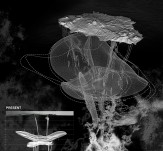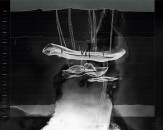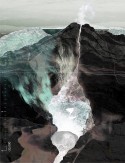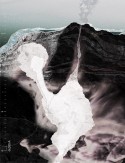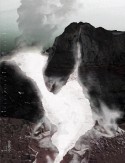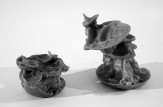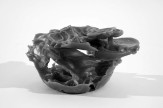Master of Architecture II Spring 2013
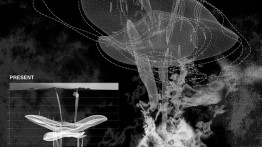
ARCHITECTURE OF NATURE/NATURE OF ARCHITECTURE
This Studio focuses on the question of Nature from the philosophical and scientific discourses that have explained it throughout history, in its transformations to the present conditions of the natural world as they affect our modes of habitation. A different dimension of space, time and scale is the object of this exploration. In this project, those questions take a preeminent position in the type of natural sites selected and the subsequent process of transformation.
The scale is vast in most cases, dealing with places such as deserts, canyons, rivers, glaciers, fault lines, volcanoes, salt lakes or seashores. These are places that took billions or millions of years to develop and thousands for transformations to be perceptible until the most recent history, where processes of transformation have accelerated. Time here is of a cosmic dimension that relates to the Universe. It not only becomes essential in every transformative proposal, but also places these conditions outside the traditional boundaries of Architecture, Urbanism or Landscape.
Historically, there has always been an active interaction between Nature – as a real object and as an object of study – and Architecture, but this interaction takes a prominent position at this moment in time. The subject of Nature in its many complex modes of interaction with Architecture – scientific, philosophic, economic, political and ideological – is critically reexamined in this studio, through a process of "reading and rewriting" at various scales, ranging from the national to the regional and the local.
Architecture in all its modes of configuration at every scale is the locus where these conditions of the natural world are enacted, moving from the ideological concepts on which the architectural discourse and the architectural project are based, to its interaction with other domains.
"Potentials" is the leading concept for this exploration; potential sources, potential sites, potential elements, potential new architectural / urban concepts. Traditional concepts such as Site, Land Use, Materiality, Ecology and Energy are critically reassessed.
< Back to Selected Graduate Design Studio Projects
VIEW INDIVIDUAL PROJECTS BELOW
Projects
-

Between Particle and Land Formations
-
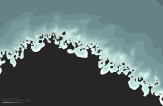
Chronicle of Eroding Forces
-
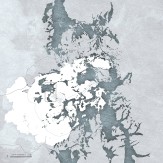
Liquid Tectonics
-
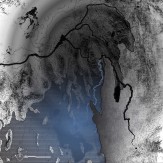
Salt of the Earth
-
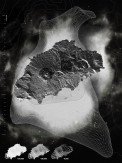
Phantom Surge
Back
Between Particle and Land Formations
Between Particle and Land Formations
Mississippi Delta, Louisiana
Ja-Sheng Chen
The multiple forces that the estuary of The Mississippi River is subjected to create a "Bird's Foot Delta." This unique landform is the result of constant sand deposits that block the river’s course, which allows the flow of water to find shortcuts to enter the Gulf of Mexico. Simultaneously, in a countermovement, the ocean forces erode the coastal edge, preventing the creation of new land. Recently, the coastal land suffered severe loss as a result of both human and natural factors. On one hand, land loss was caused the establishment of over 100 dams and the raising the sea level. On the other hand, a geological phenomenon has occurred, in which the accumulating weight of sand over thousands of years tilted the tectonic plate. This gradient, a seesaw between land and sea, not only causes the land to bulge, but alters the forming environment of the delta.
With 400 million tons of sand brought by the Mississippi River each year, researching sand movement reveals the potential for creating, manipulating and developing a new landscape.
Chronicle of Eroding Forces
Chronicle of Eroding Forces
Boreum Lee
The Apostle Islands, a group of islands in Lake Superior in northern Wisconsin, are characterized by sea caves on their edges as a result of erosion by several forces: wind, tides, waves, ice and the currents of the lake. These forces interact in the generation of this phenomenon, but through extremely different scales of time.
Time leaves its traces in the shapes of the sea caves, which have been carved out over centuries. Each force has its own time, scale and material. They are all instantaneous, but collectively, they are continuous. To read this phenomenon, the invisible forces should be considered as volume. The caves (made of sandstone) are not the figure. Instead, body of multiple forces is the figure that creates the unique surfaces of the caves. Looking at the forces of erosion over time, they have eroded the caves, but their shape has also been changed by the caves. It is an interactive relationship. It is essential to read this condition at various scales, from that of the Great Lakes to microscopic sandstone, as this illustrates that the phenomenon occurs through different forces and times simultaneously.
Through this reading, the environment can be seen making explicit the fact that there is no void or empty space. Every space is filled with a certain material, which is animated by its own force. In the interaction between different materials, there is constant action, change or disappearance.
Liquid Tectonics
LIQUID TECTONICS
Yellowstone National Park, Wyoming
Chung-Wei Lee
Heat can alter the state and shape of a substance, and this change can further trigger interacting movements, due to the unique material qualities of each substance. In the case of the Yellowstone Caldera, one of the most geologically active places of the world, its geothermal activity is made evident through geysers and hot springs, which are just a small portion of the series of transformations that originate at the outer core of the earth. When the system meets the surface, an intricate circulation of various water sources, rocks and heat is formed.
This project aims at revealing the different modes in which heat triggers and alters geological movement. Rocks, perceived as solid and static, can be melted and transported; heated groundwater under pressure can become aggressive and extremely dynamic. The findings of the project have the potential to determine a new scenario of architectonic possibilities between different materialities and thermal conditions.
Salt of the Earth
Salt of the Earth
Adam Longenbach
Lake Bonneville is ancient lake that, 17,000 years ago at its peak, was the size of current Lake Michigan. Due to climate change and receding glaciers, Lake Bonneville desiccated into two current but entirely separate entities: its waters, which we call The Great Salt Lake, and its residues, which we call the Bonneville Salt Flats. The precipitous materialization and dematerialization of the ancient lake has had lasting effects on a landscape in Northwestern Utah that is, to this day, still in the process of returning to its natural equilibrial state. Namely, the earth's crust, which is sustaining isostatic rebound from the removal of the lake's mass, and the basin's subterranean freshwater artesian aquifer, which is continually re-contaminated by residual lake salts that dissolve into its seasonal water cycle.
As the crust continues to rebound, the salty alluvial deposits of Lake Bonneville are pushed upward and pass through the underground aquifer channels, perpetually corrupting its waters. When the aquifer surfaces on the basin floor through crustal fissures, the freshwater-turned-brine water evaporates, leaving behind its salts to recharge the Bonneville Salt Flats. This project posits that it will be at least another 40,000 years before the basin reaches isostatic equilibrium, at which point both the aquifer and the soil will have been purged of the ancient lake's pernicious salts.
Phantom Surge
Phantom Surge
Seguam Island – Aleutian Arc, Alaska
Stefan van Biljon
The disjunction between Seguam's diminutive scale and the monumental vocanic, geological engines that shape it provided the impetus for its selection as a site. Though dramatic at a human scale, Seguam's topography is but a ripple produced by a titanic metabolism of time, pressure and heat beneath the earth's surface. In Seguam's scars, we read the phantom after-image of a ballet buried in the depths. What to human eyes appear timeless is, in fact, rendered ephemeral in geological time. After two cataclysmic caldera collapses 9,000 years ago, Seguam's surface was levelled and reconfigured beyond recognition, fleeting like a ripple in a pool of water. Buried engines never stop. The Aleutian Arc is grinding deeper into the Arctic Circle, pulling the western United States toward Siberia. Slowly (at 6.8cm / year), the magmatic conveyor belt morphing small Seguam is working in utter darkness to produce its masterpiece – the birth of a new continent from unstable prehistory.

